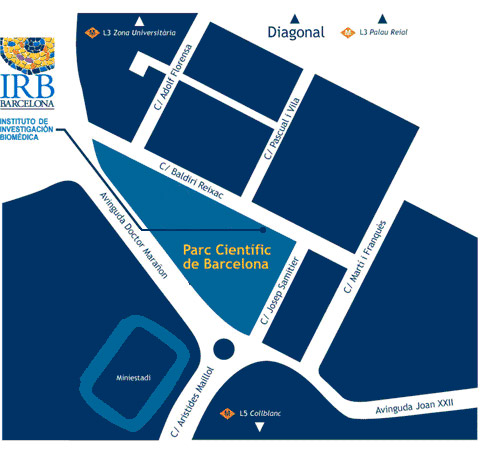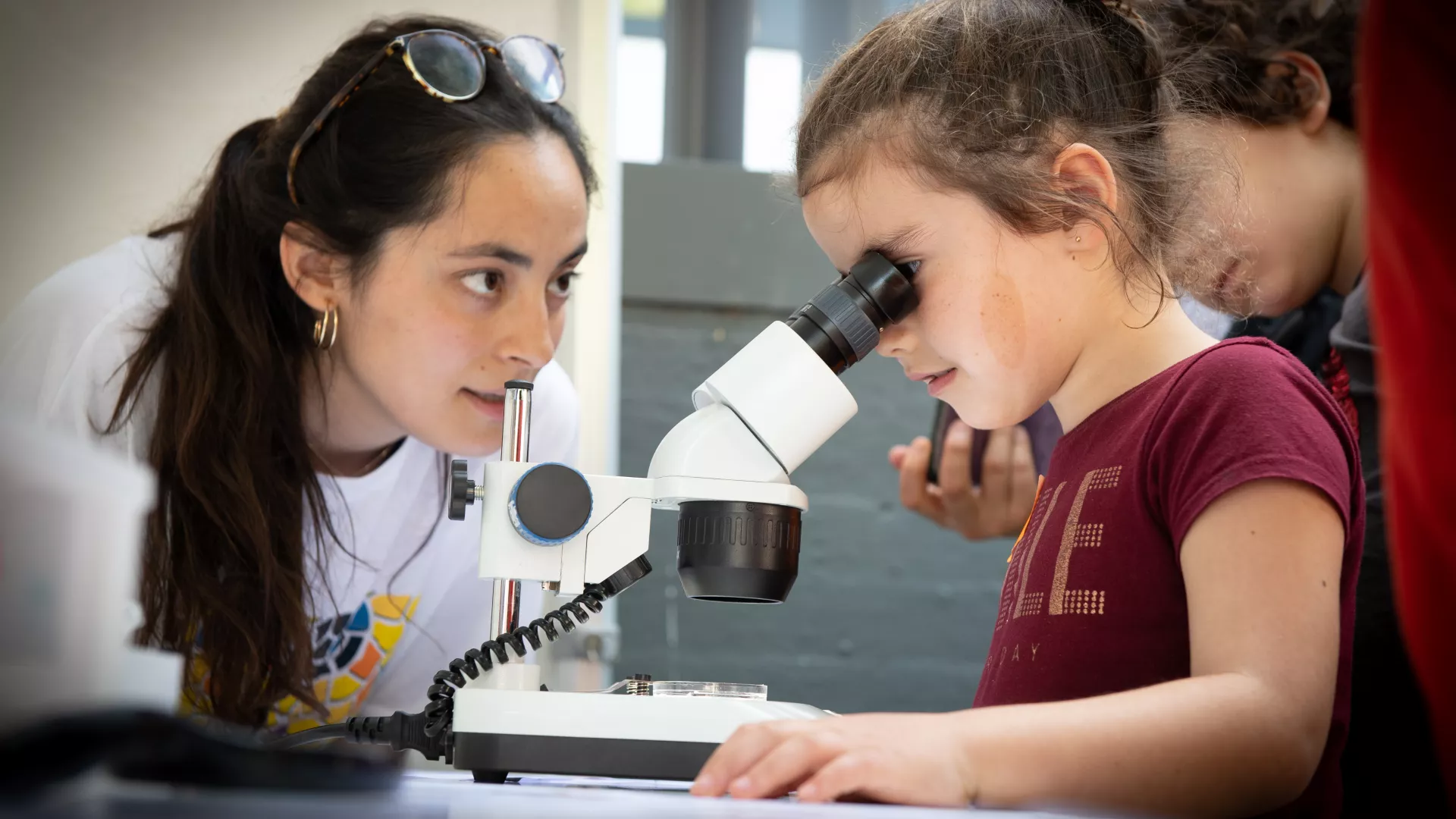Presentation
Organized in collaboration with the Catalunya La Pedrera Foundation's Teachers and Science Programme and the Barcelona Science Park
A central question in developmental biology is how a single cell can give rise to a complex, functioning life form. How does a cell know when to divide? And when to differentiate into a specific type of cell? What guides it to take up its place in a tissue or organ? How does it know when to stop growing? What determines the shape and size of a tissue or organ? And what determines how long a cell should live and when it should die? The behaviour of individual cells within an organism is dictated by a complex interaction of genetic and biochemical factors. By looking at how these basic processes work in normal, healthy cells, researchers are also able to gain insight into what takes place in cells when things go wrong, which is what happens in disease.
During the development of multicellular organisms, groups of cells assemble to form tissues that are initially homogenous. Spatial patterns begin when groups of cells “decide” to subdivide into smaller territories called compartments and stable cell boundaries are created. The mechanisms and principles that underlie the organisation and function of these different compartments and the distribution of specific molecules to each cellular sub-system are one of the challenging topics in modern life science research. In order to assemble cells into tissues, organs and even complete organisms, highly orchestrated processes, such as cell-cell communication, are needed.

Researchers have many tools available to them to study these intricate processes of development. A very popular one is the common fruit fly, Drosophila melanogaster. Fruit flies been used in biological research for more than a century, and today, several thousand scientists use it today in their labs to answer a wide range of biological questions. Part of the reason for its popularity is historical - so much is already known about it that it is easy to handle and well-understood - and part of it is practical: it's a small animal, with a short life cycle of just two weeks, and is cheap and easy to keep large numbers. Drosophila was originally mostly used in genetics, for instance to discover that genes were related to proteins and to study the rules of genetic inheritance. More recently, it has been used more often in developmental biology, looking to see how a complex organism arises from a relatively simple fertilized egg. Embryonic development is where most of the attention is concentrated, but there is also a great deal of interest in how various adult structures develop in the pupa, mostly focused on the development of the compound eye, but also on the wings, legs and other organs.
This course will address topics such as cell division, cell-fate determination, the regulation of tissue growth and how errors in these processes can lead to disease. Several topics in the curriculum of children over the age of 12 will be touched upon in this course: mitosis, cell death, genetic diseases and the ethics of animal experimentation. It will provide a unique opportunity to bring together scientists at one of Barcelona’s foremost research organizations and teachers from local schools in a true research setting to investigate some of the current questions posed by biomedical researchers and get a hands-on look at the methodologies they use. During the course, scientists and teachers will work together to develop and refine materials and resources that can then be taken back to the classroom. Teachers and scientists will also be encouraged to establish lasting routes of communication and networks, which will serve as a useful resource once the workshop has finished.
Topics
This one and a half day course will be broken down into two parts. In the first, leading developmental biologists will present an overview of current knowledge about Drosophila and discuss why it is an important tool to help us learn about human health. The second day will take a look at the specifics of fly genetics and embryonic development and will provide a hands-on look at the molecular biology techniques researchers use to create flies with specific characteristics.
During the course teachers will have the opportunity to:
- Review what is known about development in Drosophila and touch on some unanswered questions.
- Look at some of the most up-to-date techniques scientists use to study morphogenesis and cell division.
- Perform practical experiments to understand the development of Drosophila.
- Learn about the regulation of development and its implications on human health.
- Reflect on the impact of basic research on modern medicine.
Registration
There is no registration fee for this course. Lunch, coffee breaks and course materials will be provided. Participants are expected to meet their own travel expenses.
Language: the course will be run in Spanish/Catalan.
Accreditation: The course will count for 15 hours in the Generalitat’s professional training scheme
Programme
Friday, MAY 29
|
15.30-16.00h |
Welcome. Joan J. Guinovart, Director of IRB Barcelona |
|---|---|
|
16.00-16.45h |
Talk 1: Jordi Casanova, group leader IRB Barcelona/CSIC |
|
16.45-17.30h |
Talk 2: Marco Milán, Group leader IRB Barcelona/ICREA |
|
17.30-18.00h |
Coffee break |
|
18.00-18.45h |
Talk 3: Cayetano González, Group leader IRB Barcelona/ICREA |
Saturaday, MAY 30
|
09.30-11.00h |
Activity I: Create your own fly Activity II: Choose you fly (pick up, observe and select embryos) |
|---|---|
|
11.00-11.30h |
Coffee break |
|
11.30-13.00h |
Activities I and II |
|
13.00-14.00h |
Lunch |
|
14.00-16.00h |
Activity on line: Explore websites with useful tools for Drosophila that teachers and students can use in the classroom (for example, data bases from NIH, FlyMove, FlyBrain) |
|
16.00-16.30h |
Coffee break |
|
16.30-17.30h |
“Science is young” short talks by young researchers |
|
17.30-18.00 |
Feedback and questions |
Venue
ON THE FLY will take place at the IRB Barcelona facilities.

Venue
IRB Barcelona
c/o Parc Cientific de Barcelona
Carrer Baldiri Reixac, 10
08028 Barcelona
(Campus de la Diagonal, Universitat de Barcelona)
Organizers
Organisers and instructors
-
Jordi Casanova, Group Leader, IRB Barcelona/CSIC
-
Cayetano González, Group Leader, IRB Barcelona/ICREA
-
Marco Milán, Group Leader, IRB Barcelona/ICREA
-
Sarah Sherwood, Communication and External Relations, IRB Barcelona
-
Helena González, Public Engagement and Science Education Officer
, IRB Barcelona
-
Oscar Martorell, IRB Barcelona alumnus
-
Delia Ricolo, PhD student, IRB Barcelona
-
Mariana Muzzopappa, Postdoctoral Fellow, IRB Barcelona
-
Najate Benhra, Postdoctoral Fellow, IRB Barcelona
-
Lada Murcia, PhD student, IRB Barcelona

